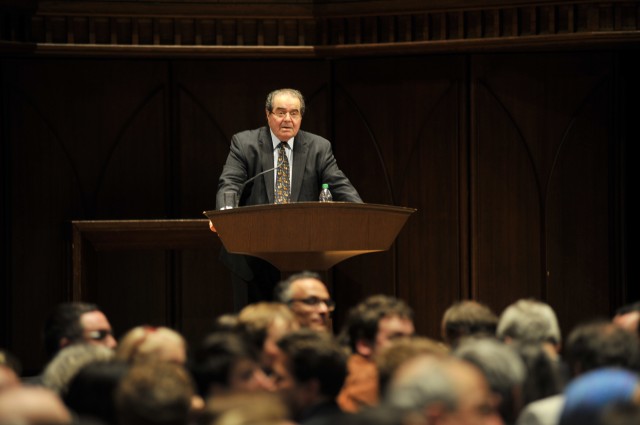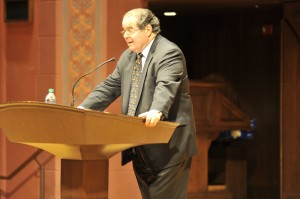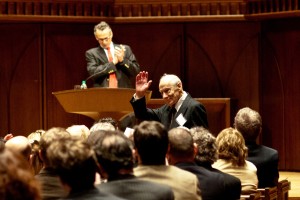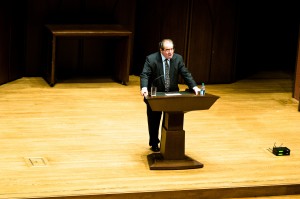Justice Scalia Delivers Defense of Originalism at Hugo Black Lecture

An originalist approach to interpreting the Constitution may not be perfect, but it’s “the only game in town,” was the message from U.S. Supreme Court Associate Justice Antonin Scalia when he delivered the annual Hugo L. Black Lecture on Freedom of Expression at Wesleyan on March 8.
“Do you think that judges—that is to say, lawyers—are better at the science of what ought to be than the science of history? I don’t think so,” Scalia told a packed crowd in Memorial Chapel. “The reality is that originalism is the only game in town; the only real verifiable criteria that can prevent judges from reading the Constitution to say whatever they think it should say. Show Scalia the original meaning, and he is prevented from imposing his nasty conservative views upon the people. […] But if original meaning is not the criteria, then what other criterion can there be that prevents judges from imposing their will on society?”

Scalia’s speech, titled, “The Originalist Approach to the First Amendment,” was also closed-circuit simulcast at the Center for Film Studies, Center for the Arts Hall and Public Affairs Center classrooms. Tickets were claimed almost immediately. Earlier in the day, Scalia joined faculty members for a luncheon at Russell House, and met with Professor of Government John Finn’s class. Following the evening lecture, Scalia signed copies of his book, Making Your Case: The Art of Persuading Judges.
Held annually since 1991, the Hugo L. Black Lecture is endowed by Leonard S. Halpert ’44, who was in the audience to hear Scalia. A commentary on Justice Scalia and the First Amendment, written by Halpert for this lecture, can be found here.
Past speakers have included Lawrence Tribe, Jack Balkin, Lawrence Lessig, and Justice Harry Blackmun, among others. One difference from those presentations: Justice Scalia’s appearance was met with a smattering of protestors both outside the chapel, where the efforts were decidedly vocal (and principally provided by visitors from the “Occupy New Haven” encampment) and few silent participants inside who used imagery and banners to make their point.
Using several past high-profile Supreme Court cases as examples, Justice Scalia presented a passionate—and at times, quite funny—defense of originalism. He illustrated the difference between an originalist and non-originalist (or “living Constitution”) interpretation of the Constitution with the example of a famous case, New York Times Co. v. Sullivan. In that case, a majority of the court ruled that libel of a public figure, when committed in good faith, was protected speech under the First Amendment. Scalia dissented.
“There’s no doubt that libel of a public figure, even good faith libel of a public figure, was unprotected by the First Amendment in 1791. Indeed, it remains unprotected even today in England. But the Warren Court had determined, as the framers had not, that allowing good faith libel of public figures would be good for democracy. And so the First Amendment was revised accordingly,” he explained. He noted that Justice Black, for whom the annual lecture is named, indicated he would have gone further by including bad faith libel under the umbrella of the First Amendment as well.

Key to his belief that libel was not intended to be protected by the First Amendment, Scalia said, was the definite article in the text: “Congress shall make no law respecting an establishment of religion, or prohibiting the free exercise thereof; or abridging the freedom of speech, or of the press…” (emphasis added). This implies that only the freedom of speech, as understood by Englishmen at the time, was protected by the Amendment; certain types of speech, including libel and incitements of violence, were not.
Scalia responded to several common criticisms of his originalist philosophy. To those who say it is merely a pretense to promote politically conservative views, he pointed to his use of originalism to defend the rights of criminal defendants and the burning of the American flag—both unpopular amongst conservatives but justified by the Constitution, in his view.
“You should be in no doubt that patriotic conservative that I am, I detest the burning of the nation’s flag, and if I were king, I would make it a crime. But as I understand the First Amendment, it guarantees the right to express contempt for the government, Congress, the Supreme Court, even the nation and the nation’s flag,” he said.
In response to claims that originalism “petrifies the law,” Scalia heartily disagreed.
“If you think that proponents of a living Constitution are trying to bring you flexibility and the power to change, you should think again. The Constitution is designed to provide not flexibility but rigidity—and that is precisely what the proponents of a living Constitution use it for…” he argued. “Do you want the death penalty? Elect those who will impose it. Do you abhor the death penalty? Elect those who will abolish it. And you can change your mind. If you find that the murder rate goes up after the abolition of the death penalty, elect those who will re-instate it. That’s flexibility and change. If, however, the living Constitutionalists had succeeded in having the Supreme Court declare the death penalty unconstitutional, the people’s power to choose would have been permanently eliminated.”

An originalist approach requires historical inquiry into the meaning of words in the Constitution, as well as the existing legal conditions during the framers’ lifetimes—which can be tricky, Scalia admitted. He illustrated this with an anonymous free speech case on which he and Justice Clarence Thomas—whom Scalia called the only other originalist on the Court—came to different conclusions. Originalism does not always yield a clear answer, Scalia acknowledged, but countered, “By contrast, how are the living Constitutionalists going to arrive at their decisions? To tell the truth, I don’t know and neither do they. How are they to decide what are ‘the evolving standards of decency that mark the progress of a maturing society?’”
Following the lecture, Scalia responded to several questions from audience members. One man inquired about the application of originalist theory to campaign finance law, referring to the infamous 2010 Citizens United case.
“The text guarantees the freedom of speech. That freedom of speech was never withheld from associations of people. Associations of people can speak just as people can speak and can band together to make their speech more effective, pool their resources,” Scalia replied. “If you’re going to deny it to corporations, are you going to deny it to the Washington Post? Most newspapers, most sources of political commentary, are corporations. How do you create an exception for that in the First Amendment? Because freedom of speech and of the press? C’mon, ‘press.’ The word ‘press’ meant publishing—anybody—not the institutional press. I’m not sure they had an institutional press.”
Scalia added that Citizens United overturned another Supreme Court decision from six years earlier, which had in turn overruled Buckley vs. Valeo, thought to be the gold standard of First Amendment law for two decades.
Also in response to a question, Scalia commented on how the confirmation process of Supreme Court justices has evolved since the Warren Court in the 1950s and 1960s began applying living Constitution principles.
“It took the people awhile to figure out what was going on. They finally realized that the Supreme Court is amending the Constitution, term by term,” he said. “Once you understand that that’s what they’re doing, the old criteria for appointments to the courts—is this person a lawyer, a modicum of judicial demeanor, a honest person—well, that’s all fine and good, but that’s not the most important thing. The most important thing is, ‘Is this person going to write the new Constitution that I like? Is it going to include the right to this or that, or abolish the right to this or that?’ It is the most important thing once you acknowledge that that’s what the court is all about.”
(Photos by Bill Tyner ’13 and Andrew Ribner ’14)

